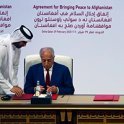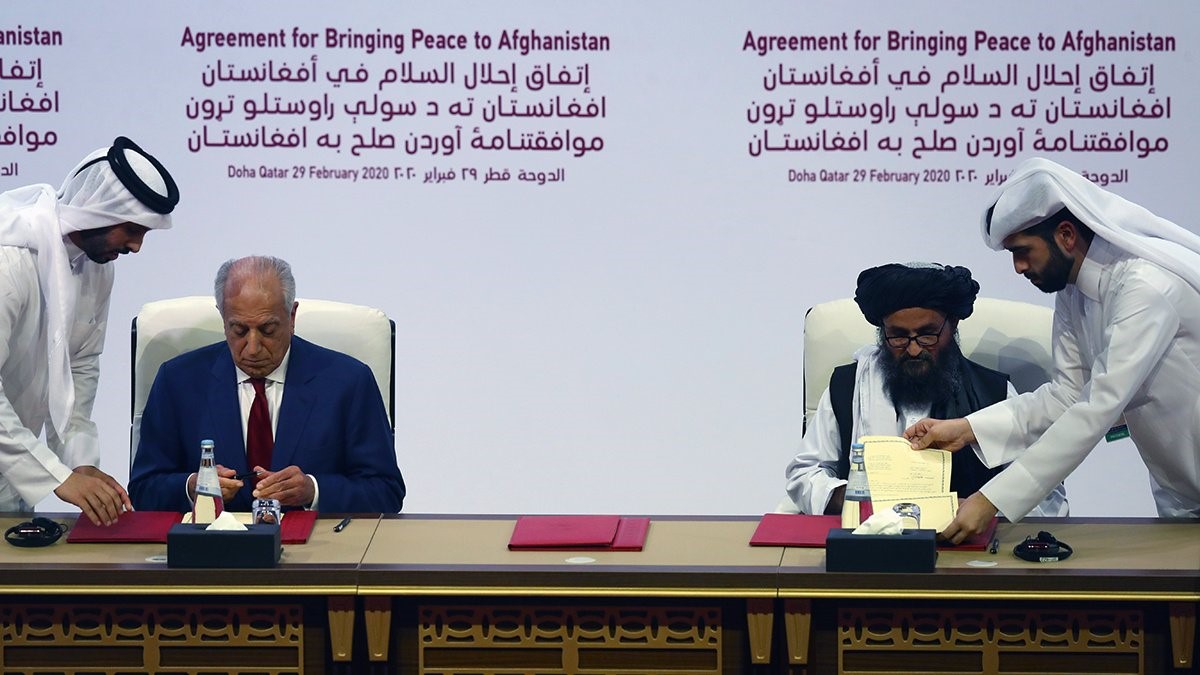Global Risk Perspectives - Monthly insights on geopolitics, trade & climate
Back to articlesBernardo Pires de Lima 

28.10.2021
The Fall of Kabul
We’re living in the era of hyperbolic, if not apocalyptic analysis. The fall of Kabul to the Taliban, one of the most pre-gamed events of latter years, has been described as "the end of an era”, "evidence of the decline of American hegemony”, and "a monumental geo-strategic debacle”. Certain moments underlie this kind of remark: journalists and pundits scour the landscape non-stop for "historic” moments to feed the online carousel of views and clicks, thus prolonging the lifespan of each event. They have that right, but I would, if I may, propose a different approach. A more dispassionate one, flushed clean of apocalyptic readings.
To be fair, a relevant part of the political/military plan that framed US exit from Afghanistan was scheduled at the NATO summit in Lisbon back in 2010, when Barack Obama held the presidency. At the time, the allies agreed to transfer to the Afghan armed forces all legitimate responsibility for, and oversight of, most operations on Afghan soil from 2014 onward, which would entail a diminishing presence of American and NATO forces on the ground. In June 2011, Obama announced the withdrawal of 33,000 troops by summer 2012, a number matching the reinforcements sent in 2009 to contain growing violence in the country. Looking at 11 years of war in Afghanistan, one that fewer and fewer Americans supported, 500 billion dollars spent, 1800 American casualties, and a presidential election in November 2012, one can't reasonably claim the decision to withdraw was groundless. Among other things, Bin Laden had been dealt with. Re-elected in 2014, Obama announced new steps for withdrawal up to 2016, his last at the White House, leaving a 10,000-strong contingent in Afghanistan. Some of those forces would train the Afghan military and another would conduct anti-al-Qaeda missions. All of this against a backdrop of chaos in Syria, Lybia, Iraq and Yemen, which stalled decisions in Washington as to whether they should intervene the way they did in Afghanistan.
Curiously, Trump’s accession to the White House did not hasten withdrawal from Afghanistan, much on account of military influence on a few political decisions. Despite the methodless madness displayed by Team Trump, the American president surrounded himself with generals as a way to legitimize his standing in the political system. These generals had never favoured hasty retreats from Afghanistan, no matter how nationalistic the motivation behind the new US president's calls. Over the two following years, up to 2019, the administration showed a willingness to come to the table with all the parties involved in the Afghan political process, including the Taliban. Which brings us to Doha in February 2020. Special US envoy Zalmay Kahlilzad, and Mullah Abdul Baradar, a leading Taliban figure released from a Pakistani prison in 2018, sign an agreement for total withdrawal by summer 2021 at Washington's request. In other words, not only did the US legitimize the Taliban as a valid, indispensable political counterpart, but they also exposed their timeline and agenda, allowing for a timely strategic reorganization that would bear fruit in the bloodless surrender of Kabul.

Add to that the allies’ alignment with decisions made in Washington, which president Biden has by and large maintained, as well as legitimation and support garnered by Taliban leadership on their visits to Moscow and Beijing. Factually, this political/military process had nothing apocalyptic about it. It was negotiated and laid out step by step among all the actors. Another angle of analysis comes to us from the media hubbub around the chaotic flight of Americans, Westerners and Afghans that worked for the allies, over two weeks that were obsessively scrutinized last August. It's this stance of disorganization, wilfulness and neglect that once again chained us to Afghanistan, not the years I described above or the decisions made then. It would make sense, therefore, to jump to (hyperbolic) conclusions, but I daresay the fall of Kabul is much more dangerous to Afghan women and girls than it is to US power in the Indo-Pacific. I would invoke three arguments.
First off, Afghanistan doesn't have the slightest trace of cohesive national identity, which exposes the population lest they accept Taliban dictates for tribal reasons. It’s identitarian tribalism that explains the nonexistence of an army capable of facing the Taliban, and permits this swift and painless occupation. That absolutist tribalism permeates their new government, where all the members are Taliban, all but a few Pashtun and, unsurprisingly, not a single woman sits among them. International organizations and governments should now attempt to influence, make demands of, and put as much pressure on the new rulers of Kabul as they possibly can, so that the rights of women and children will be safeguarded. It’s a complex mission. On the one hand, influencing Taliban leadership appears extremely difficult. On the other hand, the countries with greater sway over Kabul (financial, trade, military, diplomatic) hardly present a stellar record on human rights (Pakistan, China and Russia).
Secondly, this axis that legitimizes "new” Afghanistan has apparently outdone the US, although it's failed to cover immense responsibility as to what happens on the ground. Can they guarantee minimum standards of security internally? Can they neutralize terrorist networks, from local ISIS to more competitive franchises in the flexible market of global jihad? What if it's necessary to send troops to Afghanistan? Are they willing to do so? Let's not forget that neighbouring Pakistan has nuclear capabilities and a long-running feud with India about Kashmir. Who will uphold the new regime in Kabul, in a country that relies entirely on external aid, bilateral funding and international organizations such as the World Bank and the IMF? Is China available to support Kabul no matter what happens in Afghanistan? What happens when climate change, inflation of staple foods, and restrictions on women’s and girls’ rights make the country ungovernable, lurching from one social upheaval to the next, groaning under violent repression from the government? How will China respond to international pressure then? In case endemic violence takes hold, how will Beijing stabilize its logistics and extraction projects in the region that are fundamental to Belt and Road lanes and China’s own technological development?
Thirdly, US and NATO's (including Portugal) exit from Afghanistan, the longest, most expensive war in its history, does not entail a US flight from the Indo-Pacific region, nor that the US has given up on historic influence over the region in favour of Chinese dominance. On the contrary. The chaotic withdrawal is to be followed by a streamlining of important alliances in the region, as well as renewal of strategic action vectors, and signalling agreements with more Asian partners who are themselves concerned with China's rise. The bottom line is, the end of the Afghan cycle lets America retool its efforts and channel resources to their priority: contain China along multiple axes. Maybe the most important isn't Islamic terrorism as heralded by 9/11, or the attempt to build a pluralist regime in China, but to protect the data lanes that cross our ocean beds, those massive cables indispensable to strategic competition in the 21st century, be it on AI, on whatever comes post-5G, globalized information or cyber-security. That’s where the recent US-Australia-United Kingdom (AUKUS) comes into play: a major compensation move that immediately shifts attention away from the fall of Kabul.
Disclaimer: Bernardo Pires de Lima, research fellow with the Portuguese Institute of International Relations (Instituto Português de Relações Internacionais) at Nova University of Lisbon.
The views, thoughts and opinions expressed herein belong solely to the author and do not reflect the official positions or policies of, or obligate, any institution, organization or committee he may be affiliated with.
Bernardo Pires de Lima is Political Adviser to the President of the Portuguese Republic. He is also a Research Fellow at the Portuguese Institute of International Relations, IPRI-NOVA, an international politics analyst for the national Portuguese television channel RTP, for radio station Antena 1 and the Portuguese daily Diário de Notícias. He chairs the Luso-American Development Foundation’s (FLAD) Curators Council and has been a Research Fellow at the Johns Hopkins Center for Transatlantic Relations in Washington DC and at the National Defense Institute in Lisbon, Portugal. He has penned eight books on contemporary international politics, the most recent being Portugal na Era dos Homens Fortes: Democracia e Autoritarismo em Tempos de Covid (Portugal in a time of strongmen: Democracy and authoritarianism in a time of Covid), published by Tinta-da- China in September 2020.



